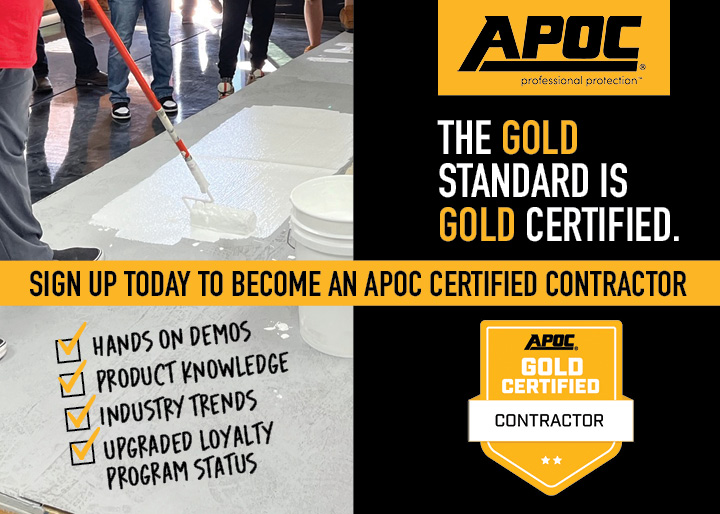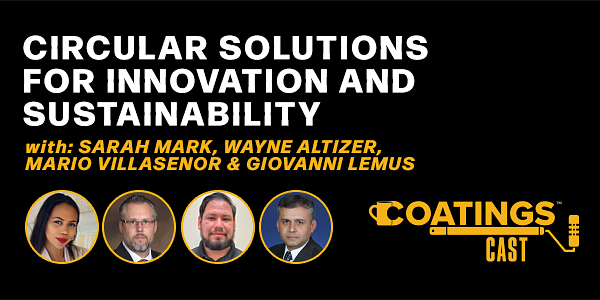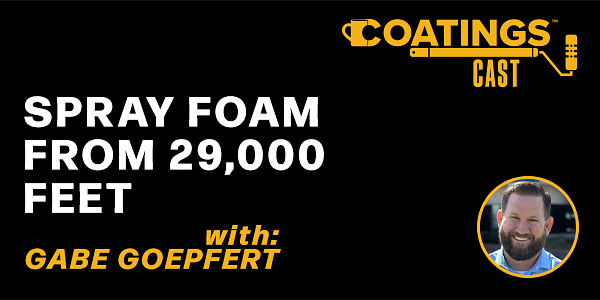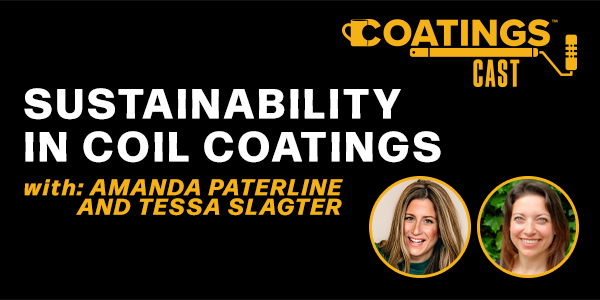UP TO THE MINUTE
Circular Solutions for Innovation and Sustainability - PODCAST TRANSCRIPT
February 12, 2025 at 12:00 p.m.Editor's note: The following is the transcript of a live interview with Sarah Mark, Wayne Altizer, Mario Villasenor and Giovanni from Topps Products. You can read the interview below, listen to the podcast or watch the recording.
Intro: This is CoatingsCast, where every drop counts in the world of roof and surface protection. Hello everyone. My name is Megan Ellsworth here at CoatingsCoffeeshop.com, and you are listening to a CoatingsCast. I am here with the amazing people from Topps Products, Topps Roofing Solutions and I'm so excited. We're talking about how this company has stood the test of time. You all are a veteran owned, independent company and I'm excited to hear everything you do. So let's start out by just having each of you introduce yourselves and Wayne, let's start with you. Tell us who are you and what do you do at Topps?
Wayne Altizer: All right. My name's Wayne Altizer. I live in Myrtle Beach, South Carolina and I'm the president of Topps Products.
Megan Ellsworth: Amazing, incredible. Sarah, how about you?
Wayne Altizer: I've been with Topps for about eight years now.
Megan Ellsworth: Sorry, I think I have a lag. Go ahead, Wayne.
Wayne Altizer: I was just saying I've been with Topps for about eight years now. I take care of most of our domestic sales and we have a large international presence as well, which we'll get into here shortly, but that's it for me.
Megan Ellsworth: Perfect. Sarah, who are you and what do you do?
Sarah Mark: Yeah. Okay. Hi, so I'm Sarah Mark. I'm the head of the Corporate Social Responsibility and the head of sales for the Caribbean, which is where I'm based. And yeah, I've been with Topps for just over a year and I am really enjoying it.
Megan Ellsworth: Wow, the Caribbean. I bet it's nice and warm down there right now. Oh,
Sarah Mark: I can hear the ocean.
Megan Ellsworth: Incredible. I'm jealous. Well, let's move on. Mario, who are you and what do you do?
Mario Villasenor: Hello, everyone. My name is Mario Villasenor. I'm a [inaudible 00:02:27] sales/technical representative here at Topps. I've been with the company for a little over two years. I'm located in Jackson, Mississippi, just territories of Vermont or Mississippi, parts of Alabama, Louisiana and parts of Texas.
Megan Ellsworth: Incredible. Wow, that's a big, big area for you.
Mario Villasenor: It is. I love it.
Megan Ellsworth: I love it. Giovanni, hello, who are you and what do you do?
Giovanni Lemus: Hi, my name is Giovanni Lemus. I joined Topps since 2019. I am the commercial director, and also do strategic alliances. I am in Mexico, I'm based in Mexico and most of the time I work expanding our presence here in Mexico and also to start expanding in Latin America.
Megan Ellsworth: Wow, this is incredible. What an international presence. We have the Caribbean, Mexico, the South. Incredible. This is so fun. I love it. Okay, so Wayne, can you start us out by just giving us a brief history of Topps and how it became a global leader in the roofing industry?
Wayne Altizer: Absolutely. So our origins start in about 1958. We began making rudimentary roof coatings, if you will. And then in about 1983 or so, we introduced our thermoplastic series and we did that with polyprene. It is our repair and our flashing product and our emergency product. It took off really, really well. It has tremendous qualities to it. So with the success of Polyprene, we developed Topps Seal and Topps Seal has become our flagship product. It is the leader in our thermoplastic series,
Wayne Altizer: And we began that in the early '80s. And we've since expanded the thermoplastic line to include the whole gamut of a roof system. We can go over all types of flat roofs, commercial and industrial flat roofs and we have a system to cover all substrates now, using the thermoplastic line,
Wayne Altizer: We also have our acrylic line, and then we have our silicone as well. So we manufacture the whole gamut of what you would consider modern roof coatings or thermoplastic... Or I'm sorry, liquid applied membranes, as we tend to refer to them.
Wayne Altizer: So that's where we started. We're now a veteran owned company. We're a hundred percent American owned, a hundred percent American made. Most of our products are either made in Cleveland, Ohio or now in our new Jackson, Mississippi plant. And we also export to about 42 countries. We're in use on every continent on earth, every climate on earth, including Antarctica. So we can handle the Brazilian rainforest, the deserts of Saudi Arabia and the cold of the Antarctic and the Arctic. Temperature, weather really doesn't bother us that much, which we're one of the few that can boast that.
Megan Ellsworth: Yeah, wow. The Antarctic, I mean, that's cold. That's really cold. Wow, that's incredible. So, as a veteran owned business, what values would you say set you apart from your competitors, besides all the amazing things you just listed, Wayne?
Wayne Altizer: We make a very valid effort, and I think we do a very good job of it, we try to hire veterans and specifically disabled veterans and-
Megan Ellsworth: That's awesome.
Wayne Altizer: ... I think, well, we have several that work for us now, both in sales and in our manufacturing plants. So we try to put the people that have put us first, we try to then put them first. And that separates us from our competitors quite significantly. The value of hiring veterans is, they've already proven their chops. They've already, if you will, taken it on the chin for the country and we feel like it's a good way for us to give back to them, to that community.
Megan Ellsworth: Yeah, absolutely. It's so important to give back to that community, and also to show that they have a space to go. They have a place to have a career after the amazing career they've already had. Absolutely, I couldn't agree more. So Giovanni, I'm going to move on to you now. What role does innovation play in Topps' strategy for staying competitive in the roofing industry?
Giovanni Lemus: We constantly move forward, have new solutions, first, that feel the needs of the market and then also that align with our portfolio of solutions. That's the main goal. And thinking about that, we have a good variety of solutions in our portfolio and when we see something new that actually we don't have, we try to have alliances with other manufacturers to offer solutions that complement the products that we offer to solve different problems. That's basically what we try to do to innovate, to stay competitive.
Megan Ellsworth: Yeah, that's a great way to be innovative, just solving problems and making sure you have a solution for every contractor and every problem that comes up, like needing a new roof in Antarctica.
Giovanni Lemus: That's correct.
Megan Ellsworth: So Mario, what are some of your most unique products that have helped the company remain independent?
Mario Villasenor: So kind of going back to question one from our origins, one of the main products of ours is Polyprene that we mentioned. And the reason Polyprene is such a big product of ours is it's an all rubber sealant designed to have long resistance. Customers really, really love this product, because they can use it on flat roofs, on commercial roofs, but the best thing that customers really, really love about this, is that it has a two-year shelf life, even after they open it.
Megan Ellsworth: Oh wow.
Mario Villasenor: It gets the life's worth out of it, and it comes in multiple variety of sizes, five gallons, three gallons and even tubes. We have them in tubes so they can use them wherever they need to be used. Another product that we have that kind of stands out is what we call the seam rivet guard. This goes on your metal roofs, designed to go all over your seams, your rivets for help, basically help with the resistance of daily thermal shock. And that product, the best thing about it, it can be rolled or sprayed on. So contractor's preference.
Megan Ellsworth: Okay. I love that.
Mario Villasenor: It has a long high elongation of 420% and the PSI is 1000 pounds of PSI resistance of tensile strength on it.
Megan Ellsworth: Wow, that's a lot. Incredible. Okay, so Sarah, Topps is known for its commitment to sustainability, which I love. Can you share some of your key initiatives in sustainability?
Sarah Mark: Yeah, for sure. So I'm also really passionate about this, so I enjoy being in this role.
Sarah Mark: So sustainability is kind of at the heart of Topps products, and this has led us to a lot of sustainable initiatives around the world where Cool Roofing is concerned. So our initiatives have taken us from the U.S., to the continent of Africa. It's taken us to Asia, it's taken us to here in the Caribbean right now.
Sarah Mark: So one of our notable initiatives was the Royal Palace in Kuala Lumpur, so that we did a Cool Roofing project there. And it's such a great product that they'll be using us again for the same thing. And we're working on a project here right now, where we are going to be repairing and cooling the roof for a school for special needs kids here on the island that I'm in.
Sarah Mark: So yeah, we really prioritize sustainability and work that in with our corporate social responsibility. And we actually, that's why a lot of our products are sustainable. And so we actually have a new product that'll be coming out soon, which we'll talk about a bit as we go on in the podcast. But yeah, on Topp Slope, it's what's known as a circular product, so it's made from recycled materials.
Megan Ellsworth: Oh, awesome.
Sarah Mark: Yeah, so it kind of just prevents discarded material from ending up in landfills, just like our other roof repair products do, our sustainable products. We try to really make sure that, in our industry we're not contributing to climate change, global warming and just other things that contribute to that. So yeah.
Megan Ellsworth: I love that is so, I don't want to say refreshing, but it's kind of refreshing and I love that. And with the cool roofs as well, that is something with the urban heat island effect that's happening right now in cities everywhere across the globe, it's so nice to hear a company like Topps being so aware of the effect that you all can have and really having a positive effect. That's really cool. So thank you for sharing.
Sarah Mark: Yeah, of course.
Megan Ellsworth: Wayne, let's circle back to you. What are some lessons Topps has learned from operating in diverse markets with extreme weather conditions, like we've talked about the Antarctic?
Wayne Altizer: So the benefits that we have with being so diverse in the climates that we can function in is that we're, getting back to what Sarah was saying, we're capable of salvaging these roofs that would end up in landfills across the world and we get another 20 to 30 to 40 years life out of them. So we're not just polluting our planet, we're actually preventing the island effect like you had mentioned.
Wayne Altizer: But we're also preventing so much from going into our landfills, and it really helps out when you can add an extra 20 years life to an existing roof instead of tearing it off and just throwing it away.
Wayne Altizer: Getting back to your question though, about working in different environments, that just speaks to the tenacity of our Thermoplastic series. It's a very hardy product and it allows us to function in 150 degree heat versus 20 below, 30, 40, 50 below. And we're able to take that Cool Roofing technology and give it to areas of the world, and areas of our country as well, that haven't had it in the past and it really works out very well.
Megan Ellsworth: Yeah, I can only imagine. I mean, there's nothing like the feeling of knowing that you're preventing a lot from going into a landfill. I mean a roof that is, like you said, a lot of material and you're giving it another 20 years. What a great feeling to have.
Wayne Altizer: Yeah, it's fantastic.
Megan Ellsworth: Yeah, that's amazing. Okay, so Giovanni, what is Topp Slope? Sarah mentioned it and how does it address some of the biggest challenges faced by roofers today?
Giovanni Lemus: Sure. Well, top Slope is our new launch. It's a roof leveling compound to solve the problem of water ponding areas on flat roofs. So it's an important addition to our portfolio and it's made of recycled material. That's how we contribute to this recycling strategy and initiative of sustainability. And it's made, it's a mix of components that with a very light addition of extra weight to the roof, you can solution those problems of ponding water that stay on the roof for two days or even more.
Giovanni Lemus: It can give the appropriate slope and direct the water to the right places to remove from the roof. So that's a way that this product works.
Giovanni Lemus: Another benefit is that it works for most of the substrate, it's compatible and also the coatings that can be applied on top of that are also very wide. So it's a very, I would say, a universal solution to solve these types of problems.
Megan Ellsworth: Wow. Yeah, that's great. What would you say led to the creation of this? I know, I mean you've already kind of mentioned the ponding water and all that stuff, but do you have any insight as to what led to this? I know this is a curve ball question, but I'm just curious.
Giovanni Lemus: Sure. No, this is a very common problem for roofers and also building owners and we try to bring something to the market that solves that problem and also that we can contribute. And that's how we been working on this product and on this solution to solve that very common problem. One of the causes, that it produces a leaking damage of the roof and maybe on many other things related to that. And considering that, that's why we decided to bring a solution like this.
Giovanni Lemus: The other thing is that it is very resistant and it adds a very lightweight addition to the roof, so it's a robust solution.
Megan Ellsworth: Okay, love that. Incredible. Well, thank you. So Wayne, lastly, how does Topps plan to further its commitment to sustainability in the future? I'm excited to hear what you have to say.
Wayne Altizer: We have several things in the pipeline that we're working on now, but a few of the things that I'll mention, we are now into the solar realm with our solar tubes offerings. We're getting into other realms of sustainability that, with products that we're trying to bring out or planning to bring out, first, second and third quarter of this year.
Wayne Altizer: So we're always experimenting and we're always looking for other products that will help with sustainability and keeping material out of our landfills. And if we can add to the Cool Roofing while we're doing that, it's just an added plus for us to kind of add to what Giovanni was saying with the Topp Slope. It's a wonderful product that solves a very basic problem that has been around for decades that nobody's really addressed, and we were able to address it in a sustainable way, which we're very, very proud of.
Wayne Altizer: And I think some of the products that we have coming out this year, you'll also see that same level of sustainability going forward, that it's kind of in the back of our minds at all times when we're trying to increase our product offering to the public and to our customers. So it's very much a focus of ours, and we try to incorporate it in pretty much everything we do.
Megan Ellsworth: I love that. That was a great answer and I look forward to seeing what else you all do over there at Topps. I love chatting with companies like you all that are really trying to do better and to make the world a better place. So thank you for all that you do. And where can people find Topps products and learn more about Topps?
Wayne Altizer: Well, they can go to our website, of course, that's first and foremost and they're welcome to contact us directly. We're sold through distribution nationwide. In the pockets of the country where we don't have distribution set up, we allow direct purchasing. But yeah, have them just reach out to us. We're happy to talk to them about any problems they may be having with their commercial or industrial roofs.
Sarah Mark: Awesome. And if I can just add to that as well, on our website, which is Toppsproducts.com, you can also subscribe to our newsletter. And our newsletter, we send it out monthly and we just talk about things going on in the company, new products that are coming out. We talk about sustainability, give roofing tips, depending on the season, we talk about things you can do to help maintain your roof throughout winter and stuff like that. So the newsletters are really insightful, and that can be found on the website, which is Toppsproducts.com, every month. And our blogs are on the website.
Megan Ellsworth: Love it. Okay. I'm going to subscribe right now.
Sarah Mark: Yeah, you should.
Megan Ellsworth: Perfect. Everyone can also go to the Topps Products directory on coatingscoffeeshop.com and find all this information there as well. And everything that we've discussed will be linked down below in the show notes. For everyone listening, thank you all so much for chatting with me today. This has been a blast, and I hope to have you all on another CoatingsCast podcast very soon.
Wayne Altizer: Thank you.
Mario Villasenor: Thank you.
Wayne Altizer: Appreciate it.
Megan Ellsworth: Thank you. Everyone out there listening, please go to Coatingscoffeeshop.com to learn more. And again, go to the Topps Products directory on Coatingscoffeeshop.com to find out more about them and we'll see you next time on CoatingsCast.
Outro: All Things Roof Coatings. Until next time, stay coated. For more information, go to Coatingscoffeeshop.com.
























Comments
Leave a Reply
Have an account? Login to leave a comment!
Sign In